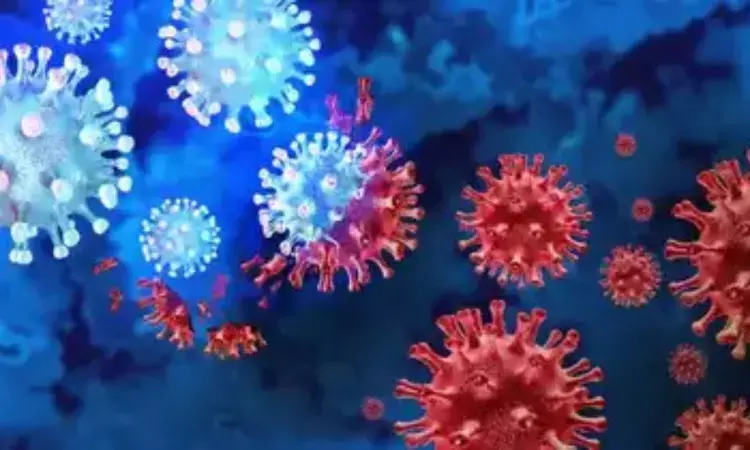- Home
- Medical news & Guidelines
- Anesthesiology
- Cardiology and CTVS
- Critical Care
- Dentistry
- Dermatology
- Diabetes and Endocrinology
- ENT
- Gastroenterology
- Medicine
- Nephrology
- Neurology
- Obstretics-Gynaecology
- Oncology
- Ophthalmology
- Orthopaedics
- Pediatrics-Neonatology
- Psychiatry
- Pulmonology
- Radiology
- Surgery
- Urology
- Laboratory Medicine
- Diet
- Nursing
- Paramedical
- Physiotherapy
- Health news
- Fact Check
- Bone Health Fact Check
- Brain Health Fact Check
- Cancer Related Fact Check
- Child Care Fact Check
- Dental and oral health fact check
- Diabetes and metabolic health fact check
- Diet and Nutrition Fact Check
- Eye and ENT Care Fact Check
- Fitness fact check
- Gut health fact check
- Heart health fact check
- Kidney health fact check
- Medical education fact check
- Men's health fact check
- Respiratory fact check
- Skin and hair care fact check
- Vaccine and Immunization fact check
- Women's health fact check
- AYUSH
- State News
- Andaman and Nicobar Islands
- Andhra Pradesh
- Arunachal Pradesh
- Assam
- Bihar
- Chandigarh
- Chattisgarh
- Dadra and Nagar Haveli
- Daman and Diu
- Delhi
- Goa
- Gujarat
- Haryana
- Himachal Pradesh
- Jammu & Kashmir
- Jharkhand
- Karnataka
- Kerala
- Ladakh
- Lakshadweep
- Madhya Pradesh
- Maharashtra
- Manipur
- Meghalaya
- Mizoram
- Nagaland
- Odisha
- Puducherry
- Punjab
- Rajasthan
- Sikkim
- Tamil Nadu
- Telangana
- Tripura
- Uttar Pradesh
- Uttrakhand
- West Bengal
- Medical Education
- Industry
Paxlovid treatment fails to prevent long COVID in vaccinated, nonhospitalized individuals

USA: A recent study published in the Journal of Medical Virology has revealed the ineffectiveness of Paxlovid (Nirmatrelvir-ritonavir) in reducing the risk of developing long COVID in vaccinated, non-hospitalized individuals during their first COVID-19 infection.
The team of researchers from UC San Francisco also found a higher proportion of individuals with acute symptoms rebound and test-positivity than previously reported.
Paxlovid treatment for acute COVID-19 is effective for high-risk unvaccinated individuals. But the effect of the treatment on long COVID risk, including whether it protects vaccinated people from getting long COVID, has been less clear.
The research team selected a group of vaccinated people from the UCSF Covid-19 Citizen Science study who had reported their first positive test for COVID-19 between March and August of 2022 and who were not hospitalized. Some of these participants reported taking oral Paxlovid treatment during the acute phase of their COVID infection, while others did not. In December of 2022, they were invited to answer a follow-up survey with questions about long COVID, COVID rebound symptoms and how long they continued to test positive.
Researchers found the two groups were similar. About 16% of those treated with Paxlovid had long COVID symptoms compared to 14% of those who were not treated with the medication. Commonly reported symptoms included fatigue, shortness of breath, confusion, headache, and altered taste and smell. Those who took Paxlovid and then went on to develop long COVID reported as many long COVID symptoms as those who were not treated with Paxlovid. A small percentage of people developed severe long COVID, and those who had received Paxlovid were just as likely to have severe Long COVID symptoms as those who did not.
Among individuals who experienced symptomatic improvement during Paxlovid treatment, 21% reported rebound symptoms. And among those with rebound symptoms, 10.8% reported one or more Long COVID symptom compared to 8.3% without rebound symptoms. For participants who repeated antigen testing after testing negative and completing treatment, 25.7% reported rebound test positivity. In total, 26.1% reported rebound symptoms or test positivity.
“We found a higher proportion with clinical rebound than previously reported but did not identify an effect of post-treatment rebound on long COVID symptoms,” said study first author Matthew Durstenfeld, MD, MAS, a cardiologist and UCSF assistant professor of Medicine. “Our finding that Paxlovid treatment during acute infection is not associated with lower odds of long COVID surprised us, but it is consistent with two other rigorously conducted studies finding no difference in post-COVID conditions between 4 and 6 months after infection.”
The authors note that the study may have been impacted by limitations arising from its observational nature with researchers relying on patient self-reporting of treatment and Long COVID symptoms.
Reference:
Matthew S. Durstenfeld, Michael J. Peluso, Feng Lin, Noah D. Peyser, Carmen Isasi, Thomas W. Carton, Timothy J. Henrich, Steven G. Deeks, Jeffrey E. Olgin, Mark J. Pletcher, Alexis L. Beatty, Association of nirmatrelvir for acute SARS-CoV-2 infection with subsequent Long COVID symptoms in an observational cohort study, https://doi.org/10.1002/jmv.29333.
Dr Kamal Kant Kohli-MBBS, DTCD- a chest specialist with more than 30 years of practice and a flair for writing clinical articles, Dr Kamal Kant Kohli joined Medical Dialogues as a Chief Editor of Medical News. Besides writing articles, as an editor, he proofreads and verifies all the medical content published on Medical Dialogues including those coming from journals, studies,medical conferences,guidelines etc. Email: drkohli@medicaldialogues.in. Contact no. 011-43720751


